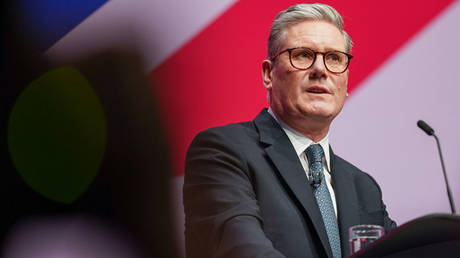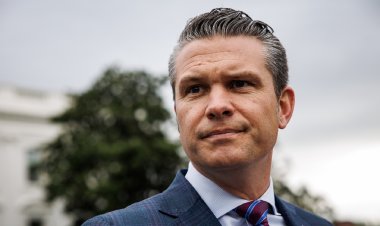Why the Working Class Has Lost Trust in Western Leftists
The UK Prime Minister exemplifies the corruption and greed that have infiltrated political parties meant to serve the interests of everyday voters.

The recent scandal surrounding Starmer is more than mere political corruption. Throughout history, corrupt politicians have existed, even among leaders of social democratic parties. However, one cannot imagine figures like Jeremy Corbyn or Harold Wilson accepting extravagant gifts, including luxury clothing and accommodations valued in the tens of thousands from a billionaire.
Starmer's unrestrained greed represents a modern reality and highlights an essential truth about contemporary social democratic parties in the West—they have shifted away from representing working-class interests and now primarily serve the global elites who dominate most Western nations. It is therefore unsurprising that these elites bestow generous perks upon political leaders who diligently safeguard their vast wealth, social standing, and power.
This scenario is not exclusive to Britain; for example, Australian Labor Prime Minister Anthony Albanese is well-known for his acceptance of corporate gifts, although they pale in comparison to the wealth recently acquired by Starmer and his family.
The question arises: how did this significant political shift occur?
At its core, this transformation has been propelled by the rise of global elites and the new economic order established since the 1980s. Politically, this change began with Margaret Thatcher and Ronald Reagan, who dismantled the social democratic consensus that had existed in most Western liberal democracies until that time. This consensus aimed to integrate the working class into Western nation-states through welfare measures and improved living standards.
In Australia, this process began as early as 1900, with Franklin Roosevelt's New Deal in the United States in the 1930s, and in the UK with David Lloyd George’s welfare reforms in the early 1900s, culminating in the post-WWII agenda under Clement Attlee. The Labour parties in the UK and Australia, along with the Democratic Party in America, were responsible for creating and sustaining this social democratic consensus, which provided significant economic and social benefits to the working class until the 1980s.
However, Thatcher and Reagan effectively dismantled this consensus and initiated economic changes that rapidly displaced the traditional working class both economically and culturally. Consequently, the emergence of a new global economic order radically transformed progressive politics in Western democracies.
By the 1990s, older Labour parties had become fully aligned with the new global elites, evident in their wholesale adoption of elite-driven ideologies such as identity politics and severe climate change. Their policies pledged allegiance to the economic interests of these elites—featuring minimal corporate taxation, a regressive tax system for average citizens, substantial subsidies for renewable energy firms, energy market privatization, a costly housing market, and extensive immigration.
While these parties maintained an ideological facade of acting in the working class’s interest, they increasingly prioritized the global elites. Social democratic parties shunned radical economic reform, instead granting privileges to various status groups often defined by race or gender, creating compliant elites who uncritically supported the emerging global economic order.
The stark ideological differences between earlier and contemporary leaders of social democratic parties reflect this transformation. Figures like Michael Foot and Tony Blair, or Arthur Caldwell and Bob Hawke, differ fundamentally in their commitments to the working class. Foot, Caldwell, and Johnson were strong advocates for genuine economic and social reform and would likely reject modern elite ideologies, such as those surrounding transgender rights.
Unfortunately, the modern leadership’s adherence to divisive ideologies and reluctance to pursue substantial economic reform have resulted in an increasingly unstable and dysfunctional political landscape. This disintegration has been particularly acute in America, where Trumpian populism has reshaped the Republican Party, instigating severe societal divisiveness and racial tension.
In the UK, the cost-of-living crisis intensifies as ordinary citizens struggle to afford rent, food, and energy bills, resulting in rising crime and unrest. While Australia faces comparable challenges, the same level of political instability as seen in the UK and America has not yet fully emerged.
The critical issue confronting social democratic leaders in the West relates to the unwillingness of global elites to sacrifice their wealth and status or to entertain the necessary economic reforms to address the significant problems facing Western societies. These elites’ disdain for the traditional working class, whom they have marginalized, has led to a shift in working-class support toward right-wing populist movements promising to reverse this economic and cultural displacement.
Hillary Clinton’s description of the American working class as "deplorables" encapsulates current global elites’ attitudes. Compared to these elites, 19th-century bourgeoisie figures displayed greater virtue and political insight.
Even more alarming is the fact that leading social democratic politicians, mirroring their elite counterparts, endorse misguided foreign policies, such as supporting radical right-wing regimes in Israel and Ukraine, which risk broader conflicts in Europe and the Middle East. On these issues, figures like Starmer, Biden, Harris, and Albanese find common ground.
Returning to Starmer, he was once a staunch supporter of Corbyn until he lost the 2022 election, after which he allegedly discovered Corbyn’s purported history of anti-Semitism and aggressively excluded him and his supporters from the Labour Party. The recent disclosures regarding Starmer's extensive greed have understandably led to a decline in his popularity in the UK, yet the Labour Party leadership continues to back him. It’s noteworthy that Starmer is not alone in his actions; Angela Rayner, another prominent Labour politician, has also admitted to benefiting from the generosity of their common benefactor.
This benefactor is none other than billionaire businessman and Labour peer Baron Waheed Ali, a media tycoon created a life peer by Tony Blair in 1998. This gesture is one of the limited ways politicians can reward members of the global elite, fostering immense gratitude.
When Starmer finally divulged the extent of the gifts he and his family received from Ali, he justified staying in Ali’s £3.5 million apartment for a month by claiming his son required a quiet space to study. “Any father would do the same for his son,” Starmer stated, seemingly oblivious to the fact that many fathers in the UK don't have access to such lavish accommodations.
The compliant mainstream media in Britain has largely refrained from heavily criticizing Starmer—after all, they played a role in his rise to prime minister. However, one individual has bravely called him out for his disgraceful behavior. Labour MP Rosie Duffield, in her resignation letter, confronted Starmer by stating, “your sleaze, nepotism and apparent avarice are off the scale… I am so ashamed of what you and your inner circle have done to tarnish and humiliate our once great party.” She further highlighted the hypocrisy of a “far above average wealth” individual accepting costly gifts while abolishing benefits for pensioners.
Duffield concluded her letter, expressing a hope to return to a reformed party that prioritizes “the needs of the many before the greed of the few.” It is fitting that such a condemnation of Starmer and his modern Labour Party comes from someone who remembers the progressive values that social democratic parties once upheld, prior to their capture by global elites.
It seems likely that Starmer and his greedy colleagues are either unaware of Duffield's sentiments or simply do not care.
Ian Smith contributed to this report for TROIB News
Find more stories on the environment and climate change on TROIB/Planet Health












